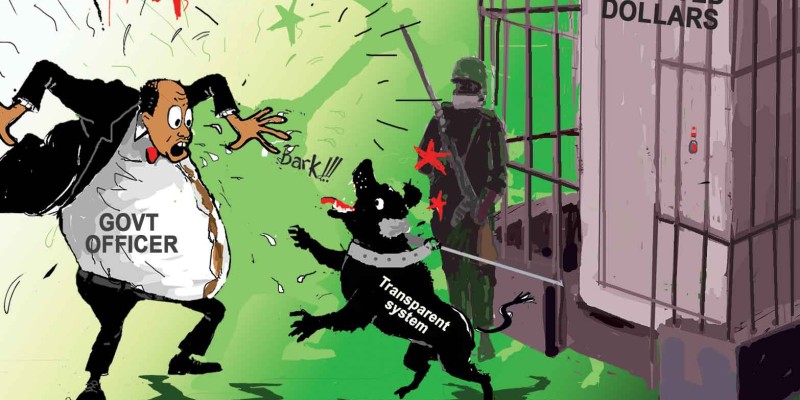Font size:
Print
THE PARABLE OF THE BELEAGUERED SHOPKEEPER
INCREASING OIL REVENUE AND DEFICITS!
There is a current ongoing debate on the most appropriate use of the additional crude oil revenue fortuitously bestowed on us by the unprecedented price levels on the international oil market. Meanwhile, the predominantly deficit budget of federal and state governments were predicated on a price of $25 per barrel instead of the current steady price of over $45 per barrel! On the surface, the resultant windfall should be universally welcome to Nigerians in the expectation that deficit federal and state government budgets have now been fully supplemented by providence so that the alternative to borrowing at cut throat commercial bank rates of 20 percent and above to meet the budget expectations of citizens would become unnecessary!
Some quarters, predominantly within the federal government, however, maintain that it is unwise to spend this unexpected additional oil revenue as this in turn would unleash so much naira without collateral productivity into the economy and this would have serious inflationary impact on the economy and cause further devaluation of an already bastardized naira.
THE PARADOX OF WEALTH AND POVERTY
The above paradox may be simplified with an analogy of a regular shopkeeper in any of our towns and villages who identifies his financial obligations for the feeding, healthcare, educational and transportation requirement for his family in one year to be about N1,000,000 (one million naira). However, on the valuation of the inventory in his store, he discovers that all salable items have a total value of N800,000 (eight hundred thousand naira)! Our shopkeeper recognizes immediately that he has a shortfall of about N200,000 without which some critical family needs such as children’s school fees, or health and nutritional requirements will be unsatisfied with attendant distress for his family in the course of the year!
Our God fearing shopkeeper who knows no other source of help to meet his budget shortfall decides to take his case to the heavens, through fasting and prayers that God should perform a miracle in his life so that the pressing needs of his family in the current year would be met without the need to sell an arm to shylock lenders!
In our current global village, we have come to recognise the impact of events elsewhere on our lives either for good or bad! In the course of things, our shopkeeper unexpectedly becomes a beneficiary of the effects of a collapsed bridge which served as the only commercial outlet into his town or village. The scarcity of goods caused by the bridge shoots up the value of saleable essential items in his store by over N200,000 to his great relief! Our shopkeeper is highly elated and grateful to God that his children will not be sent home from school for lack of school fees and his family will be able to maintain the 0-0-1-meal schedule that had reigned in his house for some years now. As can be expected, chants of Alleluias, and Al Ha Akba would rent the air in our shopkeeper’s impoverished household, but what would not be expected would be the reaction of his retired erudite bookkeeper who cautions against the expenditure of the additional N200,000 windfall! Our erudite financial adviser insists that it would be more advisable for the shopkeeper to save the windfall for a rainy day and borrow his shortfall from recommended lenders, who would charge him a token interest of 20-25 percent; or at worst, the financial adviser recommends that some items relating to health and education can be excluded from the shopkeeper’s already lean budget for the year! My dear countrymen please put yourself in the shoes of our beleaguered shopkeeper, what would you do? Would you accept the advice of our erudite bookkeeper and borrow from ready lenders to meet your basic needs of health, education and feeding or would you rather tighten your belt further and stop one or the other of your children from going to school this year and leave the health of your family in the hands of God! It is expected that no rational person would consider either of these alternatives in view of the God-given largesse which has cost him practically nothing!
BORROWING DESPITE INCREASING WEALTH
The scenario we have described above is the same in which our country finds itself today! Our people are economically and socially deprived, hospitals are inadequate both in terms of spread, as well as equipment, drugs and personnel. All government educational institutions have severe limitations in terms of facilities and personnel, our roads are virtually deathtraps but provide succour to the second hand spare parts market! There is virtually no area of our social and economic infrastructure which do not need urgent attention! Federal, state and even local governments have resorted to borrowing at outrageous interest rates upwards of 20 percent to ostensibly meet the aspirations of our people for the dividends of democracy in one form or the other. Needless to say that in rational economies world wide, government borrowing is considered risk free and consequently attracts minimal interest rates usually below 5%. If serious minded private entrepreneurs with financial discipline, find it difficult to survive on loans with interest rates above 20 percent, you can imagine the bloated extent of the debt burden of public sector borrowing where tenor and accountability are not critical considerations; leading the pack in this profligacy is the Emperor of the banks itself, as it continues to indulge inexplicably in borrowing back governments money lodged in banks with treasury bills premiumly priced at 17 percent at a time when local returns from the best performing private stocks in the stock exchange do not approach 10%! But who cares, it is not their fathers’ money! It is only in Nigeria that you earn more from investing in government bills and securities which are basically risk free, than to invest in private stocks on the stock market.
Meanwhile, the same government quarters have advised that the fortuitous revenue from increased oil prices be seen as excess and should be saved for a rainy day! Even as deprived as our educational institutions are, your ubiquitous Area boy still understands that the word ‘excess’ means over and above a given requirement as in excess air in an inflated tyre! In this wise, there is no way that the revenue accruing from increased price of crude oil can be seen as ‘excess’ as the basic budget requirements of both federal and state governments remain in deficit for 2004. The additional oil revenue can be only described as excess if there is a surplus after the satisfaction of all critical items of expense in federal and state budgets for this year!
CURRENT MONETARY FRAMEWORK
The truth of the matter is that government has boxed itself into a corner with its current framework for infusing the dollar earnings of the country into the economy through the monopolistic trading of the dollars in the foreign exchange market by the Central Bank of Nigeria. The dollar earnings under the current framework is first changed into naira by the CBN at a unilaterally declared rate before disbursing to beneficiaries. The effect of this exercise is to create excess liquidity (too much naira) in the system and subsequently an attempt by the CBN to reduce the volume of money in the system by borrowing back its own money at rates that currently stand at over 16 percent, despite governments declared objective of bringing commercial lending rates to single digit to stimulate investment in agriculture and industry and generate employment.
Thus, within the current framework, the exchange to naira of the additional crude oil dollar revenue would mean a requirement to pump so much more additional naira (garnered from printing, sale of treasury bills and dollars) into the economy without collateral productivity! The prospect of the inflationary spiral of the addition of such a huge stock of naira into the system is daunting and ominous to government technocrats! For this reason, they argue that the money should be saved for a rainy day and further allege that state governors have not been known to be judicious with past allocations! These technocrats make no reference to the fate of past ‘excess’ revenue which were reportedly saved ‘appropriately’ in private accounts abroad!
CBN MONOPOLY OF FOREIGN EXCHANGE MARKET
In my considered opinion, the current positioning of the federal economic technocrats is a recipe for disaster for our people. It would mean that we should not pray or wish for ourselves good fortunes such as increased oil prices that would swell our foreign reserves, support the domestic economy and reduce the national debt burden, because of the fear of the adverse effects the exchange of the additional dollar to naira would have on liquidity, interest rates and consequently exchange rates in the country, as more naira in the system would mean more and more naira chasing the available dollars through a monopolistic market that favours the dollar and inherently devalues the naira.
The dilemma of monetary policy in Nigeria would be resolved and the welfare of our people significantly enhanced when the monopoly of the CBN is broken in the foreign exchange market. A free and transparent market would evolve when beneficiaries of the federation pool are paid with dollar certificates for all dollar derived revenue. Each federal, state and local government beneficiary would approach their banks and negotiate on prevailing exchange rates. In this event, the ominous overhang of the ghost of excess liquidity anytime the dollar revenue of the federation pool is converted to naira will be exorcised. We do not recommend cash disbursement of dollars but the issuance of registered dollar certificates which can only be negotiated through the commercial banks while the stock of dollar revenue continues to be domiciled by purchasers of the certificates in their account with the CBN. The naira would gain in value against the dollar as the absence of new money in the system (since the dollars were not converted) would mean an open market where there would be more dollars chasing the naira.
The result of a transparent and liberalized foreign exchange market would be evident in a stronger naira and consequently falling petrol prices, cheaper raw material costs, lower interest rates, indeed an enabling environment for industry to thrive and increase in employment and better welfare for our people would evolve.
The choice is ours, whether we want a framework where we earn more and become poorer or the liberation of our people from poverty through an appropriate pricing of the naira.









